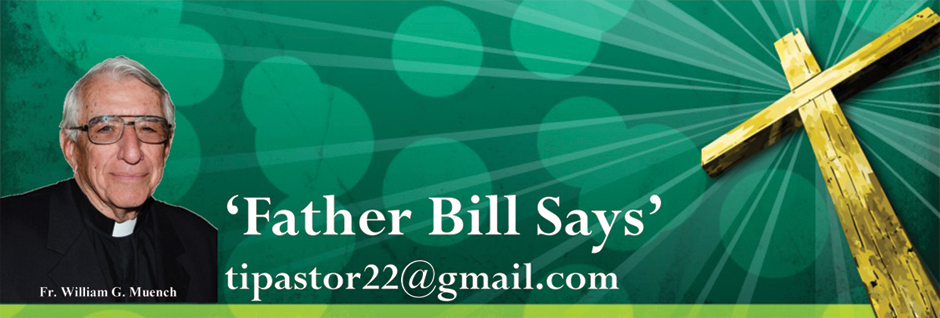Sept. 7, 2016 By Father William Muench As our Church and our diocese reflects more and more on God’s great merciful love for us all, I would like to focus today on the Sacrament of Mercy, the Sacrament of Reconciliation. You have probably noticed that many are writing about Reconciliation, about Confession these days. I know I have written about the Sacrament of Reconciliation before so forgive me, I would like to share a bit about this sacrament today. Cardinal Walter Kasper in his book, “Mercy,” expresses a tone of disappointment that few Catholics continue to celebrate the Sacrament of Reconciliation. Both Cardinal Kasper and Pope Francis urges us, priests, to make a greater effort to encourage Catholics to use this Sacrament of Reconciliation more frequently. So, today, I would like to share with you some of my reflections on the Sacrament of Reconciliation. You first learned about the Sacrament of Reconciliation at the time of your First Holy Communion. I want you to approach this Sacrament now like an adult. Many continue to go to Confession just as they did as a child with a child’s attitude. Now you have the wisdom of an adult so you should examine your life as an adult. First off, notice that the Church speaks of this sacrament as Reconciliation rather than Confession. This sacrament is about more than rattling off a bunch of sins. Here we should be considering our relationship with our God. In life we often separate ourselves from the Lord by our poor decisions – our sins. It is now time to reconcile ourselves with God in this magnificent sacrament because our merciful God invites us to celebrate his love and peace for us and experience his forgiveness. The Sacrament of Reconciliation begins with a prayerful preparation. In prayer, we ask God to become part of our lives and help us to find peace and conversion as we consider our lives and find reconciliation with the Lord. As I consider my daily life do I truly live in the spirit and with the love of my Savior? Each day God gives us so many opportunities to bring joy and peace to my part of the world. Or do I miss those opportunities – do I do nothing? Do I make poor decisions? Do I sin? So, many of us must admit that although we want to be good people – we fail. I know only too well, personally, that I fail often to make things better and happier for the people in my life, that I act selfishly. I am a sinner. This is where I need to share this, with my God, with myself, with my priest. I recognize my failings to be a loving person in my relationships. I fail to live like a disciple of Jesus and so separate myself from my God. It is time for reconciliation now. I want to be a good person. Then comes the major decision of this Sacrament of Reconciliation. “What am I going to do about this?” “What is my plan for the future?” What must I do to make my life what it should be? What must I eliminate from my life that separates me from my God? How can I work out this reconciliation with the Lord? With an open heart, the Lord will be with me to transform me into a new person, into that good disciple of Jesus. In my reconciliation I will unite myself with the Lord in a special, new way. All of this will require a spirit of penance, an honest effort to change my failings and heal my faults. In prayer, Jesus will help to transform me and, in prayer, I will allow Jesus to transform me, to heal me, to make me a new person. What a wonderful sacrament! How magnificent is the Lord’s mercy. God is always ready to forgive me. He cares about us. How wonderful to hear the words of absolution “You are forgiven.” God loves you so much, you are a good person> Now you must live as a forgiven, good person. Cardinal Kasper writes this: “This sacrament corresponds today, just as in previous times, to a deep need, and it still has relevance. It is a work of mercy, both for the individual and the church community. It could help to overcome aggression, it could assist in giving Christian humility a new lease on life, establishing more merciful dealings with one another in the church and thereby helping the Church to become more merciful.” |
||||


